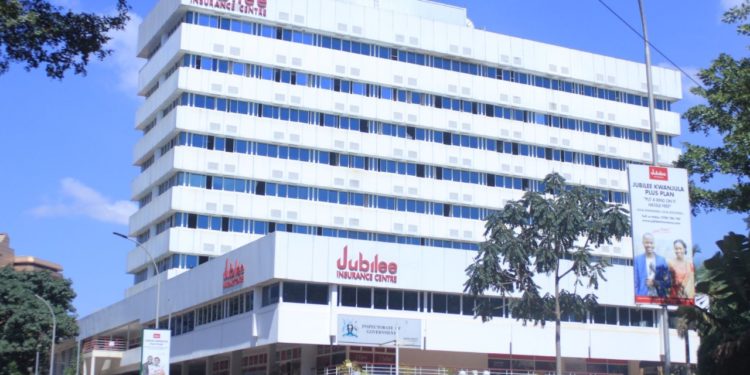Jubilee Holdings has retained the top spot as the most attractive insurance company in Kenya, supported by a strong franchise value and intrinsic value score, according to the Cytonn Investments H1’2022 Insurance Sector Report.
The franchise score measures the broad and comprehensive business strength of Insurance companies across 8 different metrics, while the intrinsic score measures the investment return potential.
The report themed “Improved Efficiency Cushions Insurance Sector’s Core Earnings Growth” analysed the H1’2022 results of the listed Insurance Companies excluding Kenya Re Insurance Corporation Ltd.
“Despite the constrained business environment arising from elevated inflation and global supply chain constraints, the insurance sector showcased resilience and recorded a 13.2% growth in gross premiums to Ksh163.1 billion in H1’2022, from Ksh144.0 billion in H1’2021. Loss and Expense Ratios across the sector eased, and consequently, the weighted average Combined Ratio improved to 126.8% in H1’2022, from 146.6% in H1’2021. However, insurance uptake in Kenya remains low with the insurance penetration coming in at 2.2% as at December 2021, mainly attributable to the fact that insurance is still seen as a luxury and is mostly taken when it is necessary or a regulatory requirement,” said Kevin Karobia, Investments Analyst at Cytonn Investments.
Read: Insurance Penetration In Kenya Remains Low At 2PC
In the period under review, the net claims for the long-term insurance business increased by 4.7% to Ksh 41.3 billion, from Ksh39.4 billion in H1’2021. Similarly, net claims for the general business also increased by 14.5% to Ksh37.1 billion, from Ksh32.4 billion in H1’2022, driven by a 23.4% growth in medical claims to Ksh15.5 billion in H1’2022, from Ksh12.5 billion in H1’2021.
“We expect a steady growth in premiums as underwriters leverage on increased technology and digital distribution channels to target a larger reach. Claims are expected to grow in line with increased economic activity and insurers should leverage on modern technology such as Artificial Intelligence to reduce insurance fraud and fictitious claims,” added Karobia.
Jubilee Holdings maintained position one in H1’2022 as was in FY’2021 mainly due to an improvement in the franchise scores as well as a high intrinsic score in H1’2022, driven by reduction in expense ratio to 33.7% in H1’2022, from 41.3% in FY’2021. As a result, the combined ratio also improved to 133.0% in H1’2022, from 149.7% in FY’2021.
Liberty maintained position two in H1’2022 as was in FY’2021 mainly due to improvement in the franchise score in H1’2022, driven by the improvement in the loss ratio to 60.6%, from 78.3% in FY’2021.
Read: Allianz Completes Acquisition Of Majority Stake In Jubilee Insurance East Africa
CIC Group improved to position three in H1’2022, from position five in FY’2021, on the back of improved franchise and intrinsic scores driven by improvement of its loss ratio to 68.8% in H1’2022, from 71.6% in FY’2021, and two combined ratio to 118.4% in H1’2022, from 123.8% in FY’2021.
Britam Holdings declined to position four in H1’2022 from position three in FY’2021 driven by a weak franchise score attributable to the deterioration in the loss ratio to 73.5%, from 66.9%. However, the combined ratio improved to 151.5% from the 164.2% in FY’2021.
Sanlam declined to position five in H1’2022 from position four in FY’2021 mainly due to deterioration in both the franchise score and intrinsic value score.
“We are of the opinion that It is prudent for insurance firms to optimize their portfolio by re-evaluating their products and services to sustain the sector’s recovery and realize profitability. Insurers should focus on their core and profitable offerings and dispose non-core offerings; this is achievable through sale of business units considered unprofitable. The underwriters should also develop strategies to further lower the high expense ratios which are wearing down the premium growth,” said Christopher Aura, Investments Analyst at Cytonn Investments.
The table below ranks Insurances based on franchise and intrinsic ranking which compares metrics for efficiency, growth, and profitability, among other metrics:
Table 2: Cytonn’s H1’2022 Listed Insurance Companies Earnings and Growth Metrics
Core earnings per share growth recorded a weighted growth of 16.0%, compared to a weighted growth of 127.6% in H1’2021. The decline in earnings was attributable to a slower premium growth during the period following a slower economic growth and deteriorated business environment, coupled with declines recorded in investment income.
Read: Insurance Industry Pays 1.9 Million Claims In Q2 Of 2022
The premiums grew at a slower pace of 1.7% in H1’2022, compared to growth of 6.3% in H1’2021, while claims declined significantly at a rate of 8.7% in H1’2022, from the 29.1% growth recorded in H1’2021 on a weighted average basis.
The loss ratio across the sector eased to 83.4% in H1’2022, from 92.8% in H1’2021.
The expense ratio eased to 43.4% in H1’2022, from 53.8% in H1’2021, owing to a decline in operating expenses, a sign of increased efficiency.
The insurance core business still remains unprofitable, despite the combined ratio improving to 126.8% in H1’2022, compared to 146.6% in H1’2021.
On average, the insurance sector delivered a Return on Average Equity (ROaE) of 3.4%, a decline from a weighted Return on Average Equity of 6.2% in H1’2021.
Email your news TIPS to editor@thesharpdaily.com

















